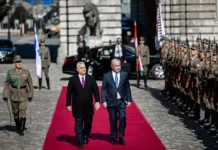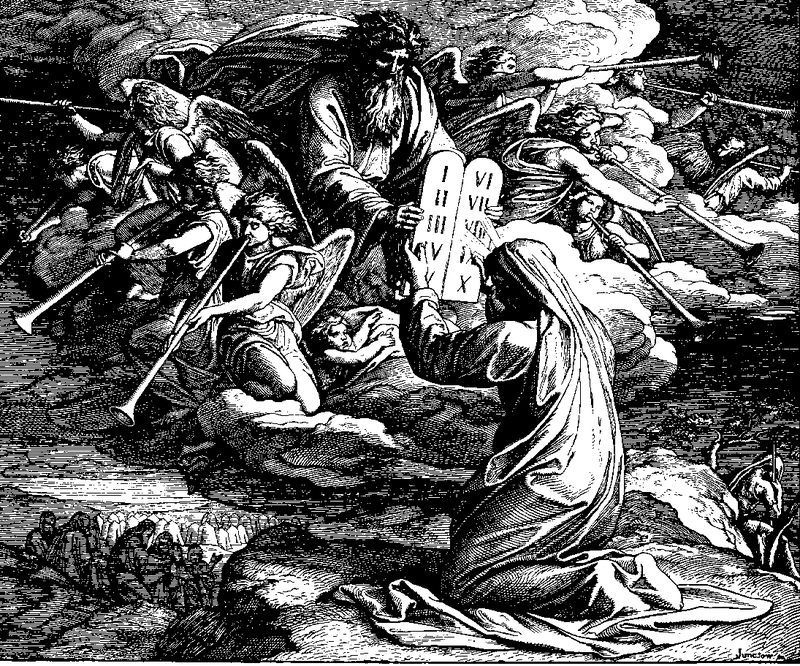In this Parasha Bnei-Yisrael’s most Divine purpose is fulfilled, as they received the Ten Commandments (“עשרת הדיברות”). The entire prophecy of our forefathers and the main reason for creation is receiving our Torah. Yet this Parasha bears the name of a non-Jew (at first), the head priest of a tribe named Midian (“מדין”). This Parasha has a very complex identity and issue with regard to its name. It is one of the most important Parashot in the Torah, one might even argue that it is the most important Parasha in the Torah. Some have asked, how can a Parasha be named after Yitro (“יתרו”) and not after the Ten Commandments?
Before we answer, one must understand who Yitro was. Yitro was a leader of hundreds of thousands (if not millions) of non-Jews, a leader in today’s terms who would be similar to the Pope for the Christian people. He was a top advisor to the most powerful ruler in the world, Pharaoh. He was also Moshe’s father-in-law. In Hebrew his name means Yoter (“יותר“), more/extra. His name is also derived from the word Heter (“התר”), meaning permission. Yitro in his own merit was rewarded with having this Parasha named after him. He had seven names: Re’uel, Yeter, Yitro, Chovav, Chaver, Keni, and Putiel. These names all have special meanings and some even have HaShem’s name in them. The word “יתרו” Yitro in hebrew while rearranging the letters will spell “ויתר” “Viter”, meaning gave up; referring to his religion and converted to judaism.
The first word in our Parasha is “Vayishma” (וַיִּשְׁמַע – he heard) which has a hidden acronym alluding to Yitro’s action upon hearing specific news:
וַ – Vov – “וַיִּשְׁמַע” “Vayishma” (he heard)
יִּ – Yud – “יתרו” “Yitro”
שְׁ – Shin – “שבאה” “Sheba’a” (came)
מַ – Mem – “מלחמת” “Milchemet” (the war)
ע – Eien – “עמלק” “Amalek
Yitro heard that Amalek was heading towards Bnei-Yisrael to wage war, and he chose to join Bnei-Yisrael by converting and accepting the fact that HaShem is the only mighty God. We also learn from the word “וַיִּשְׁמַע” “Vayishma” about salvation and redemption when rearranging the letters; the word “Moshia’a (“מושיע”) will emerge.
Why did Yitro come towards Moshe? The Torah writes (verse 6) that he told Moshe “I am your father-in-law Yitro” (“אני חותנך יתרו”) however, we already know this fact. There are several explanations to why Yitro reestablished his position as Moshe’s father-in-law. One is to teach us a hidden code in these words. The first letter of each word spells the word “Achi” אחי” – my brother. The Ariz”l teaches us that Yitro had the Neshamah “נשמה” of Kayin (“קין”), while Moshe had the Neshamah of Hevel (“הבל”), the brother Kayin murdered. Yitro was coming to bring back to Moshe (Hevel) the sister whom Kayin (Yitro) took from Hevel after he killed him; the sister’s Neshamah is now Tziporah (“ציפורה“), Moshe’s wife. It is known that Hevel had two sisters and Kayin had one, due to his jealousy he killed Heval and too his sister so he too will have two.
Another reason that the Torah honored Yitro with his own Parasha at this epic moment of receiving the Ten Commandments is due to HaShem’s profound and unmatched love for a complete and true Teshuvah (“תשובה“) by a Ger (convert). Here is a “powerful” leader who sides with HaShem after hearing and seeing HaShem’s miracles in Egypt and in the desert. After he saw all that HaShem did (the parting of the sea, the heavenly food, the war with Amalek, and other miracles) he chose to leave his “god” and life behind and join the true God, HaShem. Yitro made a complete change in his belief and way of life, and he converted to Judaism. He went towards Moshe and the nation of Israel, both literally and spiritually. Only after he converted, the Torah honored him by referring to him as “Choten Moshe” “חֹתֵן מֹשֶׁה” – Moshe’s father-in-law as it is the greatest honor.
The first word in this Parasha “וישמע”, meant to teach us about a reward for Yitro’s descendants, who received the merit to occupy the portion of land that was set aside for Beit-HaMikdash (“בית-המיקדש”). This potion of land was their place until Beit-HaMikdash will be built, four hundred twenty-six years after Bnei-Yisrael entered the Land of Israel. 426 is the numerical value of the word “וישמע” (“he heard”). The question is who did he hear it from? The Midrash tells us that he heard that every miracle that HaShem performed also happened in the entire world, every sea split, every river had blood and hail fell everywhere. News traveled very slowly back then, yet the entire world knew all that happened in Egypt. It teaches us that when HaShem spoke, the entire world heard His voice, Yitro too heard HaShem directly.
The Zohar says that the Torah could not have been given until Yitro acknowledged and blessed HaShem. However, the main point was the advice that Yitro gave; advice from below to above, awakening below, and as a result, there was an incredible wealth of higher advice that descended from Above. The entire Torah is based on Yitroʹs advice, which again is equal to the foundation of all foundations and the pillar of all wisdom. Yitroʹs advice was how to build the system; a pyramid of leadership, and not just one person at the top. This was such basic advice that the entire Torah is based upon it, and from there we come to the giving of the Torah, the Ten Commandments.
When Moshe agreed to go down to Egypt and redeem Bnei-Yisrael he divorced his wife Tziporah, so that he would be able to fulfill his mission and Divine purpose. He did so in order to remain pure at all times as HaShem’s “visited” him often on a regular basis. Yitro brought Tziporah and her two sons Gershom (“גרשום“) and Eliezer (“אליעזר“) towards Moshe. The Torah specifically mentions her status as a divorced women (“Achar Shilucheha” – “אחר שילוחיה”). But in the next verse she is referred to as Moshe’s wife; to teach us that Moshe and Tziporah remarried. We also learn here that when Moshe first refused to go down to Egypt and redeem Bnei-Yisrael, he was punished by losing the Kehunah (כהונה) which was given to his brother Aharon. A Kohen is not allowed to marry a divorced woman even his own wife, and by being denied the Kehuna, Moshe was able to remarry Tziporah. Yitro approached Moshe and told him “I am your father-in-law, and I lived in a foreign land”, teaching us that he was ready to convert for the right reasons, for the true God, HaShem.
I would like to point out here that the word for divorce certificate in Hebrew is “G’et” (“גט”). The letters of the word “גט”, “Gimel” (“ג”) and “Tet“ (“ט”), are placed before and after the letters of the word “BeYachad” “ביחד” – (together). This word is not found in the Torah, as it is a devastating outcome for a family. When one divorces a spouse, one is essentially taking the word apart. The Kabbalah says that HaShem’s very upset when a Jewish family is “torn apart”.
In the times of King Solomon (“שלמה המלך“) many people wanted to convert but not for the right reasons of loving of HaShem and His true Torah. They only wanted to benefit from the wealth and glory of Bnei-Yisrael when they saw Beit-HaMikdash and its greatness. This was the same with the Egyptians who joined Bnei-Yisrael only after the plagues, and to redeem the wealth from Egypt. The Talmud (Zevachim) says that they were not allowed to convert. How come the daughter of Pharaoh was allowed to convert in order to marry King Solomon? The answer is that just as Yitro was very wealthy and did not convert in order to benefit from the wealth and glory of the Bnei-Yisrael, so too Pharaoh’s daughter was allowed to convert (she was one of the main reasons for the demise of King Solomon and the destruction of Beit-HaMikdash. Yitro went to the desert to meet Moshe, leaving behind all his wealth, as he understood HaShem’s greatness and wanted to be part of Bnei-Yisrael.
The Torah mentions Yitro right after the defeat of Amalek to teach us that in the time of Mashiach (“משיח”) all the non-Jews will want to convert and join Bnei-Yisrael. The Torah writes several times that Yitro was the high priest of Midian, in order to honor him for giving Moshe a refuge as well as his daughter. He was unaware of Moshe’s greatness and things to come. After he provided Moshe with good deeds he became an even greater ruler in Midian. The word “Medyan” “מדין” in Hebrew while rearranged spells the word “Dinim” “דנים” (laws), alluding to Yitro’s contribution to the law system.
Moshe, together Aaron, Nadav and Avihu (“נדב ואביהו” – Aaron’s sons), and a welcoming delegation from Bnei-Yisrael, went to greet Yitro and Moshe’s family. After the initial reception, they entered a tent; to teach us that just as Yitro welcomed Moshe and gave him a tent when they first met; Moshe too provided Yitro with a home among his people. Originally Yitro came to terminate the nation of Amalek since they had the audacity to go to war against Bnei-Yisrael after witnessing all that HaShem did in Egypt and in the desert. Yitro came to meet Bnei-Yisrael in order to honor them in front of all the nations of the world, so they will not act as Amalek did. Only after hearing from Moshe in details all about the miracles HaShem performed for Bnei-Yisrael he “rejoiced” and converted. In verse 18:9 the Torah writes “VaYichad Yitro” (“וַיִּ֣חַדְּ יִתְר֔ו”), to teach us that he was happy and became one with Bnei-Yisrael, as the word “VaYichad” means became one.
The Midrash says that Yitro heard all about what HaShem did and he was afraid, and his skin became “prickly”. Then he blessed HaShem as Torah writes (verse 18:11) “Now I know that HaShem is greater than all gods” (“עַתָּה יָדַעְתִּי, כִּי-גָדוֹל יְהוָה מִכָּל-הָאֱלֹהִים“), and blessed him for saving Bnei-Yisrael. He said that now he realized that HaShem is the only god, because as an advisor to Pharaoh he knew that no one ever escaped Egypt. Seeing that HaShem took Bnei-Yisrael out of Egypt, he gave up his idolatry, offered scarifies to HaShem and submitted to HaShem’s ruling. Moshe, Aaron, Nadav and Avihu, and the seventy elderly of Bnei-Yisrael ate with Yitro. This comes to teach us that once he converted (did the Brit Milah) as a Jew, only then he can participate in the same meal with Jews. We learn that from verse 18:9 “וַיִּחַדְּ יִתְרוֹ” “Vayachad Yitro” as the word “וַיִּחַדְּ” alludes to a sharp object “חַדְּ“ “Chad”. Other Midrashim say that Moshe went to Midian to convert Yitro’s people, and only then they “sat” and ate together.
Later on, after Yom Kippur and the giving of the Torah (the second set of tablets) Yitro advise to Moshe to set up a judicial system, helped him with handling the load of cases, since Moshe spend most of his time teaching and judging Bnei-Yisrael. Yitro foresaw that in time, Moshe will not always be there with Bnei-Yisrael to teach them and elevate them as he is in a different realm spiritually and physically. Therefore, Yitro advised Moshe to appoint assistants to help with this enormous tasks that he performed all by himself. For his advice Yitro merited to have the Parasha named after him.
Yitro “painted” a very grim reality to Moshe saying that it would be much harder for him to take this immense task all by himself. Combining teaching, judging and helping all Bnei-Yisrael with the Torah laws and their execution, would be an enormous task for anyone. Yitro advised Moshe to appoint with the approval of HaShem, righteous people, financially independent, “Anshey Chayil” “אנשי חיל” (men of valor) to assist him. The numerical value of the word “Chayal” (“חיל”) is 48, and these were the people who possessed forty-eight attributes (gates) of the Torah. Yitro said, “You, Moshe are the representative to Bnei-Yisrael in front of HaShem”; “You Moshe will teach Bnei-Yisrael the right path they must follow”; “You Moshe should find among the people of Israel’s leaders who will not be swayed and bribed, leaders who will follow HaShem’s Divine inspiration and all the Torah laws” and “These leaders shall be appointed over Bnei-Yisrael in different levels of a court system and matters”. The responsibilities of these leaders’ will be judging the people on a full-time basis. They will reign over thousands, hundreds, fifties and groups of tens and they will help ease the burden on Moshe. When a major issue arises, that they will not be able to resolve, they shall bring it to Moshe to be judged. This was Yitro’s advice to Moshe; to this day such a system exists in many parts of society, both in Israel and other nations worldwide.
In verse 18:16 we learn about the “second” Torah known as the “Oral Torah”, as it says, “and I make them know the statutes of God, and His laws“ (“וְהוֹדַעְתִּי אֶת-חֻקֵּי הָאֱלֹהִים, וְאֶת-תּוֹרֹתָיו”). This is the first time the Torah alludes to the Divine Oral Torah. Without the clarifications provided by the Oral Torah, we would have never been able to understand how to fulfill most of the laws and Mitzvot in the Written Torah. For an example, the written Torah does not provide any details on how and where one should perform the Mitzvah of Brit-Milah. Our Sages say that HaShem did not want the Oral Torah written in order to protect it from the gentiles, and to have it taught only to our children. This way the gentiles can never claim that they too, received the Torah.
Three months after leaving Egypt, on the first day of Sivan (“סיון”), Bnei-Yisrael arrived at the foothill of Mount Sinai (“הר סיני”), the most modest mountain in the desert. They camped at the East side of Mount Sinai. Bnei-Yisrael were in total unity, as one person, as the Torah uses the word “Va-Yichan” (“ויחן”), meaning “camped”, but in a singular. This word also means that HaShem liked it,as it can be read also as “VaYa-chan” (“וי-חן”). Bnei-Yisrael did full and sincere Teshuvah, and had a complete faith in HaShem. The Midrash tells us that all the mountains in the desert wanted to be chosen by HaShem for such an occasion as the giving of the Torah. Mount Sinai, being the smallest mountain, kept quiet, and for that it merited such an honor. Bnei-Yisrael camped “Neged” (“נגד”), in front of the mountain. When rearranging the letters the word “Neged” will spell “Dagan” ((“דגן”, meaning fruitful, to teach us that this mountain will yield fruit for Bnei-Yisrael for generations to come, alluding to the Torah. It also has the word “Dag” “דג “ (fish) to teach us that we will multiply like fish, and will be guarded by the Torah (water), as the fish are guarded by water. It also has the letter “Nun” (“נ”) which equals 50 in Gematria, alluding to the fifty gates of wisdom one can possess when learning Torah.
The numerical value of the words describing the encampment of Bnei-Yisrael by Mount Sinai, “וַיִּחַן שָׁם יִשְׂרָאֵל נֶגֶד הָהָר”, is 1222, or twice 611, which is the Gematria of the word “Torah” (“תוֹרָה”), indicating the unification of the Written Torah with the Oral Torah, as well as the body and soul of Bnei-Yisrael. 1222 is also the total of 47 times 26, the numerical value of the name of HaShem (“יהוה”).
Bnei-Yisrael are about to experience the most significant event in Jewish history. Prior to giving the Torah and its commandments to Bnei-Yisrael, HaShem went to all the other nations asking them if they wanted His Torah. Learning about the moral obligations they all refused. Only Bnei-Yisrael were willing to accept the Torah and its obligations prior to actually receiving it.
Moshe ascended Mount Sinai in the early hours of the morning on the second day of Sivan. HaShem spoke to Moshe from the mountain instructing him to say the following both to the “house of Yaakov” and to Bnei-Yisrael. The Midrash tells us that the “house of Yaakov” refers to the women, while Bnei-Yisrael are the men. Another explanation is that Yaakov descended to Egypt as Yaakov but he died as Yisrael; to teach us that HaShem asked Moshe to speak both to the physical and spiritual parts of Bnei-Yisrael, the body and the soul. HaShem was sating “You have seen what I did unto the Egyptians, and how I carried (bore) you on eagles’ wings, and brought you unto myself”. According to Kabbalah, the eagle is a symbol of mercy, alluding to the redemption from Egypt with HaShem’s mercy.
HaShem descended to the top of Mount Sinai and asked Moshe to ascend to its peak. Moshe was the only person in the history to bring heaven and earth together, and he was placed right between them. It is important to explain here that HaShem’s descent was not literal as He his always among us and everywhere. HaShem uses such a term in order for us to understand it at a human level. Our Neshamah is a Divine infinite particle of HaShem and through our heart and soul we feel HaShem Voice and Presence. HaShem “blew” the Neshamah into Adam’s nostrils. The word “Neshama” (“soul“) comes from the word ”Neshima” (breath). The Neshemah was always and forever created before Adam (physical being; as it is part of HaShem. So when HaShem descended to speak to us, it means to make the “Neshamah” be the vessel for His voice. Our physical parts will cease to exist but the Neshamah will forever remain.
The Torah gives a four-image description of the experience at the giving of the Torah at Mount Sinai; Bnei-Yisrael saw:
- The voices
- The torches
- The blast of the shofar
- The smoking mountain
We see here two groups of physical and spiritual components, alluding to our Neshamah and the Oral Torah, and to our body and the Written Torah; all together create our physical a reality and the spiritual, our future redemption.
While in the presence of HaShem the Neshama longs to return back to its source (the creator) just as a powerful magnetic field pulls back any elements of common components. HaShem, in His merciful ways, wanted to prevent Bnei-Yisrael from a tragic outcome, so He ordered Moshe to go down to Bnei-Yisrael and warn them from getting closer to Mount Sinai. HaShem warned even the Kohanim who are usually “close” to him while offering sacrifices, not to get closer to Mount Sinai, as they too can vanish. Why did HaShem asked Moshe to warn Bnei-Yisrael again? To teach us that as the creator He knew that the moment He will speak their Neshama would leave their bodies. The Zohar explains that HaShem actually “took out their Neshama” in order to remove the impurities they adopted while in Egypt. Only after “they returned from the dead”, were they able to truly receive the Ten Commandments (“עשרת הדיברות”).
The 10 Ten Commandments (עשרת הדיברות)
- I am Hashem your God, who brought you out of Egypt, out of the land of slavery.
- You shall have no other gods before me. You shall not make for yourself an image in the form of anything in heaven above or on the earth beneath or in the waters below. You shall not bow down to them or worship them; for I, HaShem your God, am a jealous God, punishing the children for the sin of the parents to the third and fourth generation of those who hate me, but showing love to a thousand generations of those who love me and keep my commandments.
- You shall not misuse the name of the Hashem your God, for Hashem will not hold anyone guiltless who misuses his name.
- Remember the Sabbath day by keeping it holy.Six days you shall labor and do all your work, but the seventh day is a sabbath to Hashem your God. On it you shall not do any work, neither you, nor your son or daughter, nor your male or female servant, nor your animals, nor any foreigner residing in your towns. For in six days Hashem made the heavens and the earth, the sea, and all that is in them, but he rested on the seventh day. Therefore Hashem blessed the Sabbath day and made it holy.
- Honor your father and your mother, so that you may live long in the land Hashem your God is giving you.
- You shall not murder.
- You shall not commit adultery.
- VIII.You shall not steal.
- You shall not give false testimony against your neighbor.
- You shall not covet your neighbor’s house. You shall not covet your neighbor’s wife, or his male or female servant, his ox or donkey, or anything that belongs to your neighbor.
HaShem gave us the Ten Commandments on two tablets. The five on right side reflect the commandments between HaShem and mankind. The five on left side reflect the commandments between mankind and their fellow-men. Each commandment on the right side corresponds to the commandment on left side (the first with the sixth, the second with the seventh, the third with the eighth, the fourth with the ninth, and the fifth with the tenth). For example, “I am Hashem your God” corresponds to “You shall not murder”, to teach us that HaShem created man and so no human being shall take the life of another human being. It is interesting to note that “You shall not murder” is the sixth commandment, man was created on the sixth day and there are six reasons why one might murder another.




























